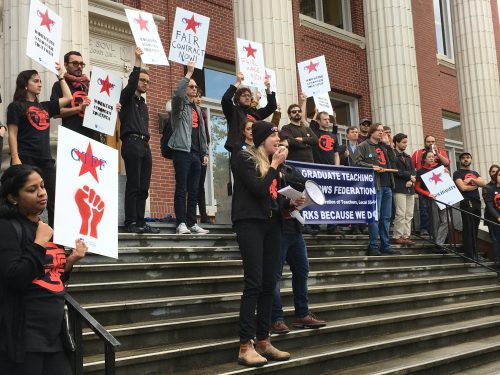
As University of Oregon students ate food and bought merchandise at the Associated Student’s fall term Street Faire, nearly 200 people rallied in front of Johnson Hall on Oct. 18, demanding that the university stop trying to drastically alter the Graduate Teaching Fellows Federation’s (GTFF) health insurance.
Kicking off with the chant, “Admin says we’re broke/We all know that Schill’s a joke,” and the Queen song “Under Pressure,” the GTFF announced that after 11 months of negotiation with the UO, 1,044 (95 percent of the union) GTFF members voted in support of authorizing a strike. The union voted throuhghout the week and had an 86 percent turnout, the GTFF said.
“The huge turnout for the vote and massive number of graduate employees voting for strike authorization is an incredible demonstration of unity in the face of adversity that UO admin is putting us through,” said GTFF VP for External Relations Rajeev Ravisankar at the rally. “Graduate employees have sent a resounding message to UO admin that we’re committed to one another and ready to strike if they don’t agree to a fair contract.”
During the rally, GTFF staff organizer Michael Marchman told the audience that the UO said the union couldn’t use amplification during the rally. Speakers used a bullhorn in speeches, but the UO had notified the union that anyone caught using amplification would face “disciplinary” consequences.
The authorization doesn’t mean the union will strike, but if the GTFF’s bargaining team doesn’t think negotiation is going anywhere, the earliest graduate employees can strike is Nov. 3, according to the UO.
The GTFF is demanding a 3 percent increase to salaries each year of the three-year contract and 1.5 percent to all other salaries each year. The UO almost meets that demand but chips the increase down by .5 percent in the first year and .25 percent the second year.
The GTFF says the wages in the UO’s latest offer doesn’t allow the lowest-paid graduate employees to keep up with the cost of living. And the university’s proposed health plan would end up as an increase in health care costs.
For health insurance, the UO has offered two options. In the first option, the UO would increase its contribution to health care by 5 percent in the first year and 1 percent each following year. On the UO’s webpage last offer webpage, the university suggests that the GTFF could cover any difference by using its cash reserve or raising members’ contributions.
The second option would continue the coverage cost share of 95 percent by the UO and 5 percent by the GTFF. However, the UO’s contribution would dwindle in covering premium increases. The UO would cover 100 percent of premium increases within 2 percent, 75 percent of 2 to 3 percent, 20 percent of 3 to 5 percent and nothing if there’s an increase of more than 5 percent.
The GTFF says graduate employees would end up paying more than they currently do under either option.
Candidate for the 4th District House of Representatives Democratic Party nomination Doyle Canning spoke at the rally. Canning’s husband is a graduate employee, so she said his insurance covers the family. She called the UO’s offer a part of the “austerity agenda.”
“While tuition for students goes up every year, health care for the lowest-paid teaching employees get slashed,” she said. “This is balancing the budget on the backs of the most-vulnerable, and I’m here to take a stand, and I’m here to fight back.”
The UO issued a statement that says the university values the work graduate employees provide to support academics and research.
“Graduate employees instruct classes, conduct research and support myriad educational programs. Negotiations continue and we are hopeful an agreement can be reached soon,” UO’s spokesperson Kay Jarvis said in a statement.
The UO and the GTFF have two weeks to agree on a fair contract before the end of a mandatory 30-day cooling-off period.